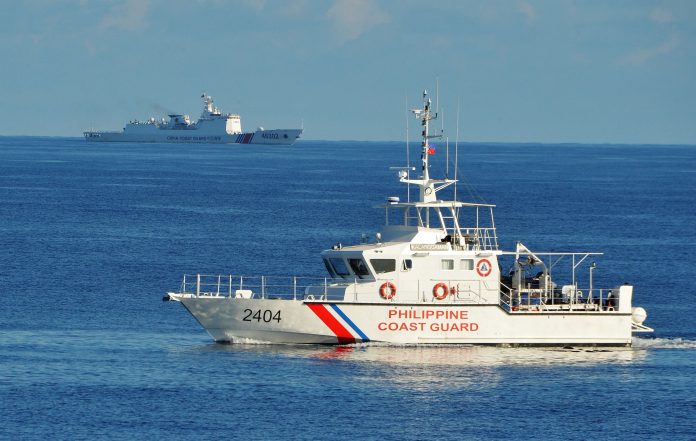Philippine President Ferdinand Marcos Jr. stated that the country would continue to seek peaceful cooperation with neighbouring countries in the South China Sea, criticising China’s illegal actions in the region.
Tensions between Beijing and Manila reached an all-time high due to China’s recent attempts to intimidate and block fishermen and coast guards from entering areas of the exclusive economic zone (EEZ), which extends 200 miles from the country’s coastline, within which it has the exclusive right to exploit resources beneath the water’s surface under international law.
Marcos claimed that China’s “coercive tactics and dangerous maneuvers” affect the Philippine Coast Guard’s resupply mission on the contested Second Thomas Shoal, known locally as Ayungin Shoal.
The Philippine leader spoke on Sunday at the Daniel K. Inouye Asia Pacific Centre for Security Studies during a visit to Honolulu after attending the APEC Forum in San Francisco.
China’s claims to territory and maritime zones in the South China Sea have led to disputes with several countries including the Philippines, Vietnam, Malaysia, Brunei, Taiwan, and Indonesia.
“My message has always been firm, simple and clear: the Philippines will continue to be an engaged and responsible neighbor – always finding ways to collaborate with the end goal of mutually beneficial outcomes, namely: peace, stability and prosperity in the Indo-Pacific region.”
Marcos called for the establishment of a maritime code of conduct in the South China Sea, stressing the urgency of such an agreement and the difficulties faced by Manila and other Southeast Asian capitals.
The South China Sea is rich in untapped natural gas deposits. According to the United Nations Conference on Trade and Development, US$3.37 trillion, or 21 per cent of the world’s total, has been transited through the sea.
Manila was still awaiting China’s participation in talks with the Association of Southeast Asian Nations on an earlier code of conduct that has seen periodic progress over two decades.
Meanwhile, he claimed the Philippines had asked other ASEAN countries, including Vietnam and Malaysia, to develop such a code, regardless of whether it would co-operate with Beijing. In response, Chinese Foreign Ministry spokesperson Mao Ning rejected Marcos’ initiative on Monday.
Any code of conduct should reflect existing arrangements within ASEAN, first promulgated in 2002, Mao was quoted as saying. Any deviation from it would be “null and void.”
The declaration, signed by ASEAN members and China, emphasises freedom of navigation, flight and the peaceful resolution of disputes in the region in accordance with the 1982 UN Convention on the Law of the Sea.
Beijing opposes Marcos’ proposal because it doesn’t desire greater unity between the ASEAN parties.
In 2016, an arbitral tribunal of the Permanent Court of Arbitration in The Hague invalidated China’s expansive claims in the South China Sea. Beijing’s representatives, who refused to participate, shut down the proceedings before they began and have not recognised the ruling since.
During his visit, Marcos met with Admiral John Aquilino, head of the US Indo-Pacific Command, where an operational review and discussion of regional security co-operation took place.
